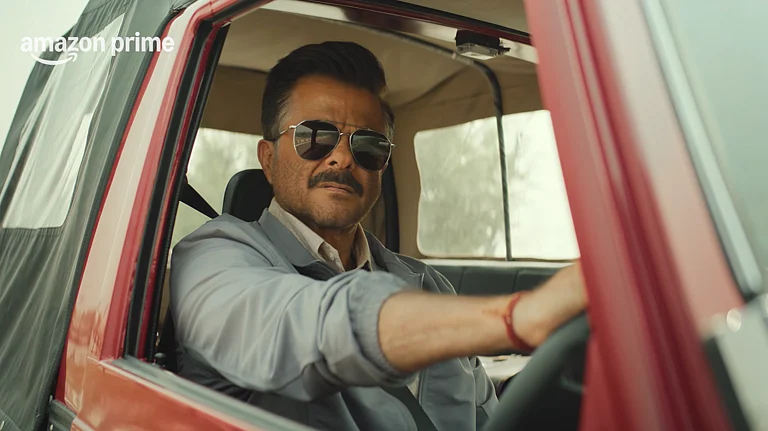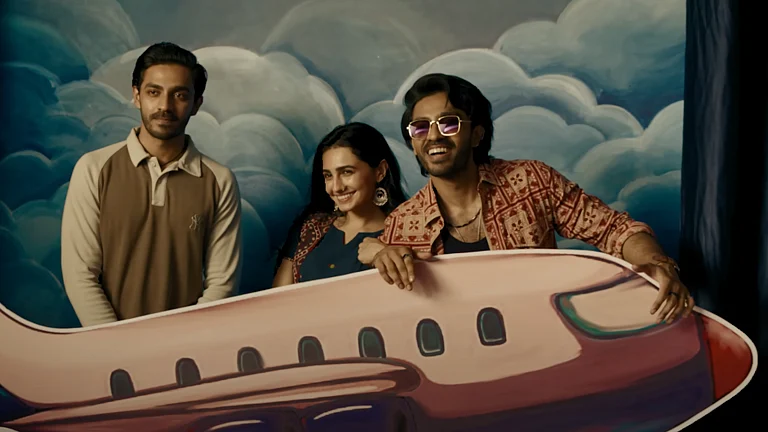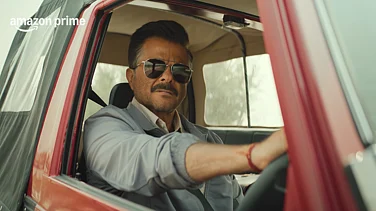
Summary of this article
The third installment of the Jolly Franchise releases on 19 September 2025.
The film is directed by Subhash Kapoor with Akshay Kumar and Arshad Warsi in lead roles.
A laughter ride laced with sharp punchlines, Kumar and Warsi’s chemistry makes it stick even through its missteps.
The Jolly LLB films have always thrived on a fixed narrative structure: an underdog lawyer, an unjust system, a judge trying to wrangle chaos into order. This blueprint bleeds into the third film as well, though its intent shifts. Subhash Kapoor figured out early that the trick lay in letting humour and horror collide, placing crooked lawyers, nasty villains, and the one judge who never loses his patience right at the centre. Jolly LLB (2013) thrived on Arshad Warsi’s scrappy persistence, while Jolly LLB 2 (2017) swapped him out for Akshay Kumar’s restless energy, powering a tale of guilt and atonement. Both films clicked because they kept focus on one Jolly, one fight, one finish line.The third film flips that neat equation. Putting both Jollys—Jagdish Tyagi a.k.a. Jolly (Arshad Warsi) and Jagdishwar Mishra a.k.a. Jolly (Akshay Kumar)—in the same ring is Kapoor’s gamble and chaos naturally follows.
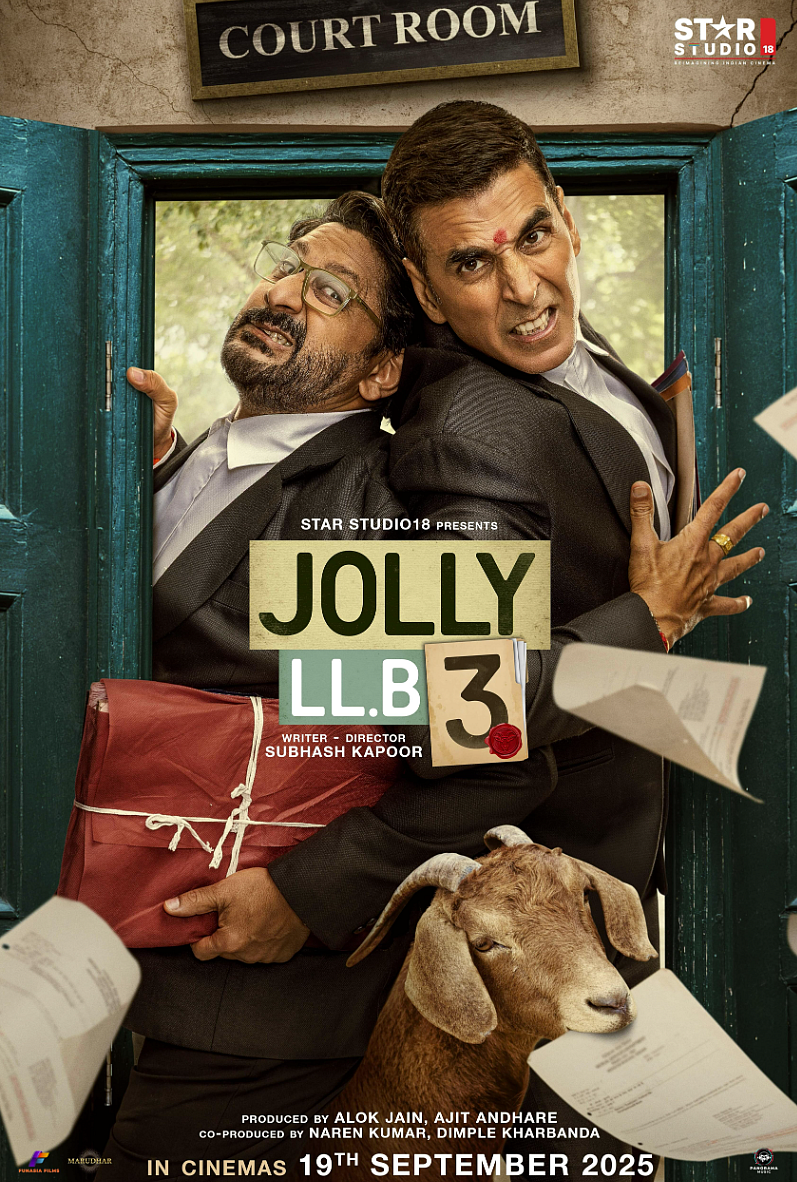
Kumar seems finally at home, slipping into the Hera Pheri (2000) and Bhool Bhulaiyaa (2007) rhythm with ease. Jolly LLB 3 (2025) turns into a full-bodied laughter ride, sharpened with well-placed punchlines that Kumar and Warsi volley back and forth with uncanny precision. Here, the heart of the conflict moves towards the farmer protests, raising sharper questions than before. The film stirs a logical debate too: no progress without sacrifice. India’s eventual turnover from agriculture to corporate might be seen as growth, but in one of the world’s largest agrarian countries, the idea grows murkier. Previously it was Boman Irani, but now, our antagonist is Haribhai Khaitan (Gajraj Rao)—an industrialist whose character is harrowing as the “well-intended in theory, but not action” kind of a villain, but the writing leaves him stranded as a sketch rather than a menace. Is poverty itself the villain, or those steering people toward it? Jolly LLB 3 asks what it means to be self-righteous—adamant about refusing to part with land or houses when dignity and respect are the first things discarded in redevelopment.
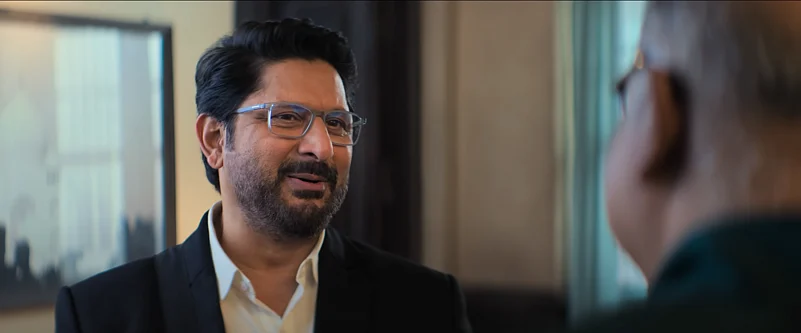
A farmer, strangled by debt, takes his life, and suddenly the farce tilts into fury. His widow, Janki played by Seema Biswas, refuses to be another statistic. Her case drags the film into deeper waters: land politics, farmer suicides, and the larger question of who really benefits when industries expand and fields vanish. The first half revels in the chaotic joust of Jolly against Jolly, where petty case-stealing and constant one-upmanship fuel the comedy. Domestic squabbles and eccentric clients add spice as the wives of both Jollys enter the mix. Huma Qureshi, Shilpa Shukla and especially Amrita Rao, who returned on screen after ages, are flowerpots and criminally undersold—Rao still frozen in the quietude of her Vivah (2006) role, Shukla merely as a love interest and Qureshi stuck between Monica O My Darling (2022) hangover and wifey caricature.

Saviour complexes linger, of course. Lawyers drift between greed and conscience, slowly confronting the human cost of their shortcuts. Like the earlier Jolly films, the guilty wake up to responsibility, yet here the dynamic doubles: Warsi and Kumar bounce off each other with effortless timing, their rivalry folding into a peculiar camaraderie. Jolly LLB 3’s charm lies in this chemistry, the film letting humour and empathy coexist, raising questions about whether redemption is ever truly individual—or always a performance in the courtroom’s unforgiving glare. The real star, however, remains Saurabh Shukla’s Sunderlal Tripathi, whose side glances, sly quips, and razor-sharp delivery are impossible to miss. He is the pulse of this world, the line between chaos and order. Even Ram Kapoor’s Vikram, the suave high-profile lawyer, manages to leave a mark in a film otherwise too eager to tilt the scales in Kumar’s favour.

Amidst the banter, the film jolts into seriousness. Janki ji’s suffering cuts through their humour, forcing an almost instantaneous reckoning within them. The Jollys now confront something bigger than ego—how does one argue justice in a system that thrives on injustice? The silver lining is also within the impartial Tripathi who symbolises faith in the judicial system, despite it all. What’s striking is how Kumar delivers perhaps his least saffron-tinged role yet, almost Kesari 2 (2025) level in its fiery questioning of the judicial system, the corporates bankrolling it, and above all, the dignity stripped from a farmer’s life. With a fiery courtroom clash staged in the first half, the second half nosedives into sermonising, weighed down by a saviour complex too familiar. The courtroom tussle keeps one seated, yet the scales tilt as Kumar slips back into his sermonizing mode, the very avatar familiar from those finger-wagging cigarette disclaimers that play before films. Still, one wonders why Warsi, the heart of the first film, is sidelined so blatantly, leaving Kumar to swoop in as the savior.

Jolly LLB 3 wobbles in places and becomes quite forgettable. Kapoor keeps the circus rolling, with a fixed script to a play, clowns and crusaders sparring in equal measure, reminding us that in this universe, justice is never delivered quietly—it arrives with a grin and a glare. And in this case, with two slogans in the closing scene : “Jai Jawaan Jai Kisaan” and “If you ate today, thank a farmer”. This film is tailored for courtroom-drama loyalists and nostalgic fans awaiting Kumar and Warsi’s reunion. Its heart is in the right place, yet the delivery stumbles. The buildup strains without reward, the finale slips into sermon, and the audience exits restless, tugged about like mismatched puppet strings.




